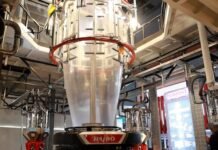Advanced and smart packaging has become more essential than ever as consumer lifestyles shift and the demand for convenience, safety, and sustainability intensifies. Consumers prefer ready-to-eat, ready-to-cook, resealable, microwaveable, and portable packaging formats that ensure ease of use, enhanced food safety, and extended shelf life. A colossal amount of food is often wasted or spoiled along the value chain, highlighting the role of reliable, high-performance, and protective packaging in reducing food loss.
Keeping such trends in mind, the Gurugram-headquartered Ester Industries, a leading manufacturer of polyester films, specialty polymers, and sustainable packaging material, has developed a comprehensive and sustainable product portfolio designed to meet the evolving demands of today’s packaging industry.
Packaging South Asia had a conversation with Arvind Singhania, chairman and CEO, Ester Industries, to know more about the company’s products and their role in reducing food waste, food-safe sustainable packaging, the circular economy, its recycling facilities, and more.
Reducing food waste, preserving freshness
Food waste remains a global concern, and protective packaging plays a pivotal role in addressing it. According to Singhania, Ester’s polyester films are engineered to retain taste, aroma, and freshness by providing robust barriers against oxygen, moisture, and aroma migration, with controlled oxygen transmission rates (OTR) to extend shelf life.
The company’s product lineup, he says, includes anti-fog films for fresh produce, formable films that replace nylon and PVC in lidding and tray applications, and coated films designed for retort packaging in ready-to-eat meals. Furthermore, high-clarity printable films maintain brand integrity and consumer appeal, and reduce retail-level waste. These tailored solutions—covering fresh produce packaging, retort pouches, and tray-lidding applications—are instrumental in reducing food waste while maintaining freshness and quality.
Ester integrates sustainability into performance, he says. “Importantly, we can manufacture our films with 100% recycled content or customized post-consumer recyclate (PCR) levels ranging from 30 to 100%, combining performance with sustainability to address both food preservation and circularity.”
Sustainability through recyclability
Recognizing the growing challenge of packaging waste, the company, Singhania says, addresses recyclability through both product innovation and dedicated recycling infrastructure. The company’s patented technologies enable the production of mono-material polyester laminates, which are chemically recyclable and offer enhanced sustainability without compromising performance.
Its patented rPET technology yields ultra-clear, virgin-like recycled PET, facilitating high recycled content usage while preserving optical and mechanical properties. “These innovations help global brands comply with regulatory frameworks such as India’s Plastic Waste Management Rules (PWMR) and international mandates for PCR utilization.”
Ester’s joint venture, Ester Loop Infinite Technologies (ELITe), with Loop Industries, will process polyester textile waste and PET bottle scrap to produce 70,000 tons of recycled polyester chips annually for export. It enables textile-to-textile, bottle-to-bottle, and laminate-to-laminate recycling, achieving “infinite” recyclability by converting even complex polyester waste into virgin-quality PET.
The company operates two mechanical recycling facilities—Sitarganj (8,000 TPA) and Hyderabad (20,000 TPA)—providing a combined 28,000 TPA rPET capacity. “These facilities produce food-grade, high-quality rPET resin, which is used in Ester’s polyester packaging films, further supporting the circular economy,” he says.
Ester’s mono-material and high-barrier film solutions
We asked Singhania how Ester is focusing on mono-layer and high-barrier solutions vis-à-vis the problematic multi-layer packaging, as well as the difference in durability and cost-effectiveness.
The company’s strategy, he explains, emphasizes balancing recyclability with performance. Wherever possible, the company promotes mono-material PET films and All-PET laminate structures, which simplify waste management and recycling while aligning with sustainability goals.
“For packaging requiring extended shelf life or high product protection, Ester offers transparent high-oxygen-barrier films, boilable barrier films, and ultra-high-barrier metallized films—ideal for retort pouches, bag-in-box solutions, and long-shelf-life FMCG applications where durability and product safety are critical,” he said.
From a cost perspective, mono-material films reduce overall lifecycle costs through easier collection and recycling, while multi-layer structures remain suitable for applications demanding maximum barrier performance.
FSSAI norms and rPET in food packaging
We also asked how the company plans to comply with FSSAI’s guidelines for rPET in food packaging and the cost-effectiveness of rPET.
Ester’s patented rPET technology, Singhania says, delivers near-virgin quality recycled PET, both chemically and physically. “All rPET is produced using FSSAI-compliant, food-grade systems, ensuring complete safety for food-contact packaging.”
The company’s rPET production adheres to FSSAI standards, with facilities certified under FSSC 22000, ISCC Plus, and GRS 4.0. These processes guarantee compliance with stringent food safety regulations, he says.
“Our joint venture ELITe will use polyester textile waste and PET bottle scrap as feedstock to produce 70,000 tons of recycled polyester chips annually. This production will be entirely exported to international markets, enabling global brand owners to meet their recycled-content targets and decarbonization commitments. The process delivers virgin-quality rPET, making it ideal for high-clarity, food-grade applications,” he said.
Singhania said while sustainable packaging may carry a slightly higher cost, rising consumer awareness and regulatory pressure have increased market acceptance. “Today’s consumers are willing to pay a premium for eco-friendly and responsible packaging, making sustainable packaging solutions both commercially viable and environmentally beneficial.”
“We have already showcased these rPET solutions at Elite Plus, reinforcing our commitment to food-grade compliance and sustainable packaging innovation,” he said.
Recycling for food and FMCG packaging
Ester’s Hyderabad recycling facility, he says, represents a major step toward strengthening circularity within the food and FMCG packaging ecosystem. With an installed capacity of 20,000 tons per annum, the plant utilizes advanced technology to produce food-grade rPET resin that meets the safety and regulatory benchmarks.
In addition to food-grade products, the facility manufactures semi-dull rPET grades for textile applications, broadening Ester’s recycling capabilities across multiple sectors. “By scaling up food-safe and textile-grade recycling, our Hyderabad facility reinforces Ester’s commitment to reducing dependence on virgin materials and driving sustainable growth through innovation and responsible recycling.”
De-inking challenges in food-grade rPET
De-inking remains a significant technical challenge in food-grade rPET production, especially when handling labeled or printed packaging waste. Ester, he says, tackles this with advanced decontamination systems at its recycling plants.
The Hyderabad facility employs the Gneuss OMNI 200 recycling system, which integrates advanced extrusion, filtration, and degassing technologies. “The RSFgenius rotary filtration system removes fine contaminants effectively, while the MRS extruder enhances decontamination performance—enabling the conversion of printed and labeled PET waste into high-quality, food-safe rPET resin.”
For complex waste streams such as textiles and heavily printed PET, the ELITe joint venture uses a chemical recycling process that depolymerizes polyester into rDMT and rMEG before re-polymerization into virgin-quality chips. This method effectively removes inks, dyes, and coatings at the molecular level, overcoming de-inking challenges and ensuring food-grade purity, he says.











